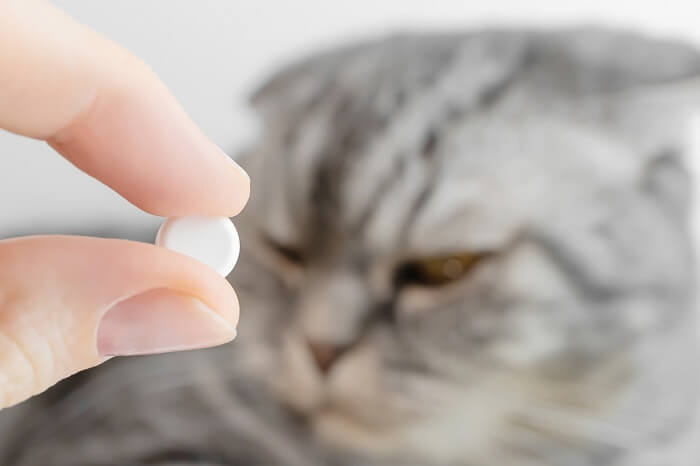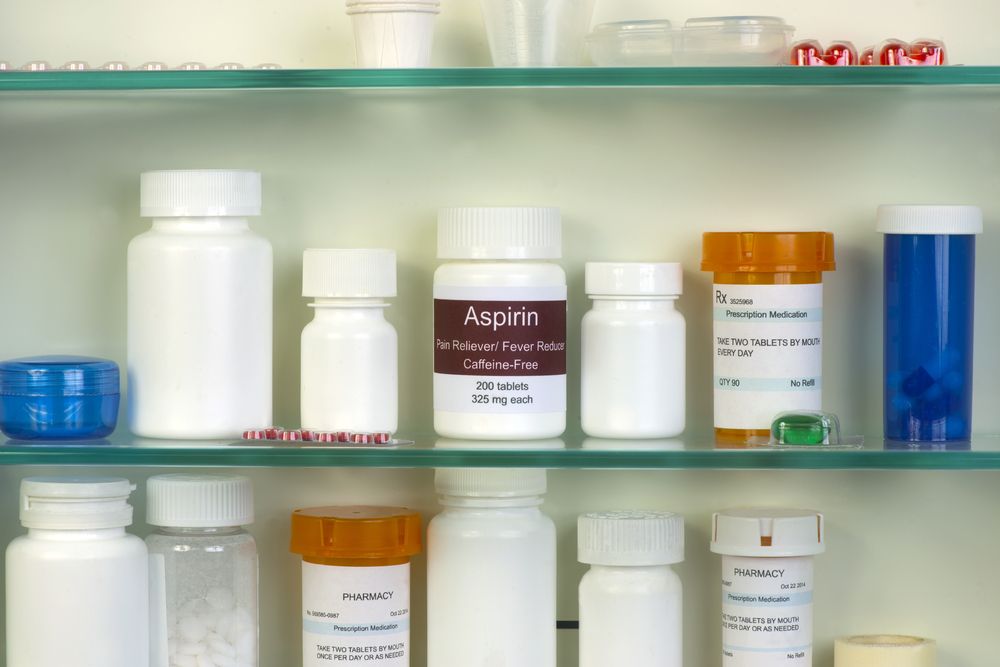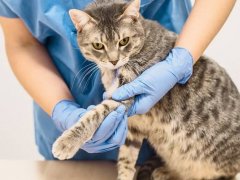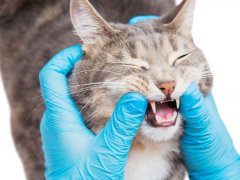
Aspirin, also known as acetylsalicylic acid, is a common poison to affect cats. This article aims to explain the background to Aspirin poisoning, helping cat owners to understand why it happens, what can be done if their cat is affected, and how to prevent it from happening in the first place.
Quick Overview: Aspirin Poisoning In Cats





Aspirin may be the active ingredient in a number of human over-the-counter pain-relievers and there are other medications known as salicylates that are related to aspirin.
About Aspirin Poisoning in Cats
Aspirin is a non-steroidal anti-inflammatory drug (NSAID) which is widely used as an over-the-counter medication in humans for its analgesic (pain relieving), antipyretic (fever reducing) and anti-inflammatory properties. More recently, it has also been used for its anti-platelet activity in some patients, to reduce the risk of blood clots in certain situations.
Aspirin is metabolised in most species by conversion to inactive compounds that are then excreted by conjugation with sulfate and glucuronide. Cats only have low levels of the enzyme glucuronyl transferase, which is needed to produce these conjugates. This means that the drug cannot be metabolised as quickly in cats as it is in other species.
The low level of this enzyme is the reason why cats are also very vulnerable to poisonings by other common over-the-counter medication like ibuprofen and acetaminophen (Tylenol).
The poor metabolism of aspirin means that its half-life is longer in cats than in other species (24 – 48 hours). This makes cats highly vulnerable to toxicity from Aspirin compared to other species. Aspirin toxicity can follow from a single dose of Aspirin, at doses as low as 10mg/kg which would be safe in other species.
The most common cause of poisoning with Aspirin in cats is when an owner gives the medication to their pet, making it especially important that people are informed that this is not a drug that is safe to be used in the treatment of cats. Rarely, a cat may consume medication that is left unattended and within reach.
How Aspirin Affects Cats
Aspirin toxicity causes a range of toxic effects in cats. The main issues are gastrointestinal bleeding, along with metabolic acidosis and liver damage, along with the possibility of kidney failure and damage to the central nervous system.
Symptoms of Aspirin Poisoning in Cats

The symptoms of Aspirin poisoning in cats include anorexia, abdominal pain, lethargy, weakness, and more.
Aspirin causes clinical signs in cats that are linked to gastrointestinal bleeding (in the stomach and small intestines), metabolic acidosis, and liver damage.
Anorexia, abdominal pain, lethargy, weakness, along with (possibly blood-stained) vomiting and diarrhea and/or melena (blood in the feces), with pale gums, may be seen.
In more severe cases, more severe signs of acidosis are likely. These include hyperthermia, tachypnea (rapid breathing), seizures, and coma.
The anti-coagulant side-effects of aspirin may lead to delayed blood clotting, resulting in prolonged bleeding episodes. Liver damage may lead to further signs of illness, perhaps with icterus (jaundice).
Diagnosis of Aspirin Poisoning in Cats
1. Detailed History Taking
Your vet will discuss every aspect of your cat’s background and overall care. The circumstances will often give rise to a suspicion of Aspirin exposure (e.g. an owner giving their pet this medication).
The amount of aspirin that has been given is highly significant, and a local animal poison control center or the ASPCA poison department may be contacted as part of this initial discussion.
2. Physical Examination
Your veterinarian will check your cat over carefully, checking for any signs suggestive of Aspirin poisoning. In particular, examination of the mucous membranes for pallor or jaundice is important.
3. Routine Blood Tests
It’s very likely that your DVM veterinarian may carry out routine blood work, including the usual panel of diagnostic tests, such as hematology (blood count) and biochemistry and electrolyte profiles.
Characteristic abnormalities include anemia (low red blood cell count), and biochemical changes include raised liver enzymes, reduced protein levels, and elevated bilirubin (jaundice).
4. Specialised Blood Tests
Blood clotting times may be prolonged, and blood bicarbonate levels may be reduced.
It may also be possible to ask a specialist laboratory to carry out tests to measure aspirin levels in blood or urine.
5. Urinalysis
Changes in the urine reflect the metabolic acidosis and other toxic effects of aspirin on the cat’s body.
6. Other Tests
Radiographs (X-rays) may show edema of the lungs (pulmonary edema), while endoscopy may reveal the presence of gastric ulceration.
Treatment of Aspirin Poisoning in Cats
Induction of emesis (vomiting) or gastric lavage can be an effective way of removing the Aspirin from the cat’s stomach if this is carried out promptly enough (within hours of ingestion). Activated charcoal may also be recommended in an attempt to limit absorption of Aspirin from the digestive tract.
Otherwise, support treatments are given to counteract the adverse effects of aspirin toxicity, such as gastric protectants (such as Pepto-Bismol) for gastric ulcers, oxygen supplementation if there is difficulty breathing due to acidosis, and intravenous fluids and/or blood transfusion if there has been blood loss. If liver failure develops, SAM-e (an antioxidant and liver protectant medication), n-Acetylcysteine, and ascorbic acid (Vitamin C) may all be recommended.
General supportive treatment is also important, including B vitamins, anti-emetics, and good nursing care (eg to maintain normal body temperature and normal blood flow to the extremities). Intensive monitoring, including checking urination, defecation, and other bodily functions, as well as repeated blood tests, is an important part of the care of these patients.
Prevention of Aspirin Poisoning in Cat

Pet owners should store Aspirin safely, out of the reach of pets, and the medication should never be given to cats.
Conclusion
Aspirin poisoning is a common poisoning in cats, usually caused by the administration of the medication to a pet cat by an owner. If a cat is known to ingest this medication, prompt action by taking the cat to the emergency veterinarian is essential and can be life-saving.
Frequently Asked Questions
What are the signs of Aspirin poisoning in a cat?
Typical signs include anorexia, abdominal pain, lethargy, weakness, along with (possibly blood-stained) vomiting and diarrhoea, and pale gums. In more severe cases tachypnea (rapid breathing), seizures, and coma may be seen. Furthermore, the anti-coagulant effect of aspirin could lead to delayed blood clotting, resulting in bleeding episodes, and jaundice may be seen due to liver damage.
How much Aspirin can a cat have?
Aspirin should never be given by an owner to a cat unless it has been specifically recommended by a veterinarian for a specific cause at a specific dose (e.g. a very low dose may be suggested on an alternate day basis to reduce blood clotting in some cats with heart disease). A toxic dose is easy to give by mistake which is why care needs to be taken.
How do you treat Aspirin toxicity in cats?
Initial steps include removal of the drug from the stomach by inducing vomiting and reducing absorption by giving activated charcoal. Emergency veterinary treatment may include medication to limit the impact of the damage caused by Aspirin, along with general supportive care.
Can Aspirin PM kill a cat?
Aspirin toxicity can be fatal, which is why it’s important never to give this drug to cats without direct veterinary supervision.
 Fact checked by
Fact checked by







